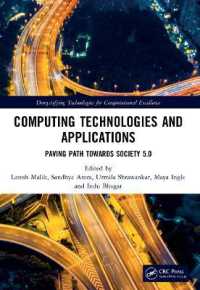Full Description
This book situates mindfulness and contemplative interaction at the heart of transformative learning for a more sustainable and compassionate world.
Drawing on a mixed-methods study of a specific set of reflective learning activities introduced to undergraduates in Canada, the book highlights the importance of critical thinking and the necessity of the underlying affective dispositions to transformative learning. It argues that contemplative practices can play a central role in creating an unexpected sense of connectedness even among students who do not agree with each other, who may come from widely different backgrounds, and who may not speak English as a first language. These practices encourage students to improve their listening skills, suspend judgments, and explore multiple points of view without confirmation bias or rigidity. Mindfulness and contemplative interaction are further discussed in the context of the growing use of generative AI in higher education and the practical issues of student evaluation and feedback.
This forward-thinking volume will appeal to contemplative practice scholars in the field of higher education, as well as educators and researchers with interests in transformative learning, critical thinking, and applied mindfulness.
Contents
List of Figures
List of Tables
Preface
Acknowledgments
Introduction
1. The Context of Higher Education
2. Mindfulness and Contemplation: Applied Mindfulness
3. Foundations for Applied Mindfulness Research
4. The Pilot Study
5. Contemplative Practices, Online Learning, and the Development of Critical Thinking
6.Conclusion and Next Steps
Appendix A: Individual and Interactive Contemplation Practices
Appendix B: Basic Mindfulness Meditation Instruction
Appendix C: Interview Guide
Appendix D: Sample Coding Sheet
Appendix E: Sample Coding Form for Quantitative Research Indicators of Reflective Dispositions
Appendix F: End-of-Term Questionnaire
Appendix G: Instructions for Weekly Assignments (Online Course Mode)
Appendix H: Guidelines for Term Papers
Index








